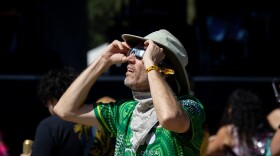This weekend, my girlfriend and I packed up my Kia Sportage and headed north. Our destination: the path of the solar eclipse’s totality in western Nebraska.
But this just wasn’t just an excursion to witness the eclipse; it was also an opportunity to cross a large swath of the High Plains Public Radio listening area--a region I love traveling through and writing about.
From Canyon, Texas, we drove up through Fritch (where my father lived) and Perryton (my dad lived there, too), then across the Oklahoma Panhandle and up through Liberal, Kansas. We made a long stay at the home of Kathy Holt in Cimarron, Kansas, herself a loyal HPPR member and friend, and then headed up through Garden City and Scott City, and on to McCook, Nebraska, where we visited Frank Lloyd Wright’s H.P. Sutton house.
On Sunday night we slept in a tent in the middle of a grassy prairie in Southwestern Nebraska, near North Platte. Then, early Monday afternoon, on a deserted corner between two dirt roads near Stapleton, Nebraska, we sat beside a cornfield and watched the sky darken as the moon’s shadow passed over the sun. Just before the moment when the eclipse reached its totality, we looked to the east, where a cloud of swallows lifted, expanding and twisting like smoke caught in a draft.
In the moment of totality, the temperature dropped, and the clouds on the horizon caught fire. We weren’t quite prepared for the eeriness of it all. The crickets' songs grew muffled. Above us, a ring of white flames had replaced the sun. In a nearby pasture, a herd of cows took up a chorus of confused moos. The totality lasted about two and a half minutes, and in that time I was aware of the clockwork motion of the planets, and how the movements of bodies millions of miles away can cast their great shadows over our tiny lives, and affect even the singing of crickets and the lowing of cattle.
I’m sure folks in South Carolina or Washington State had their own fantastical experiences. But as I stood beside that cornfield and watched the great emptiness of Western Nebraska descend into darkness, I felt a great pride in being a flatlander.
It really was something.








